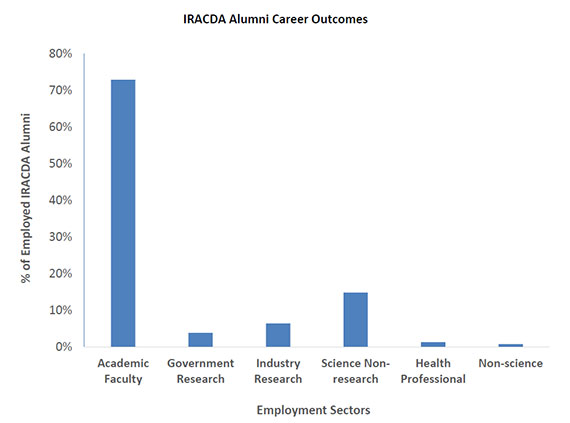We recently analyzed the career outcomes of scholars who participated in the NIGMS IRACDA program. A goal of this program is to provide a diverse pool of postdoctoral scholars with research and professional skills needed to be successful in academic careers. The program combines a mentored postdoctoral research experience with an opportunity to develop additional academic and teaching skills, including a teaching practicum at a partner institution that enrolls a substantial number of students from underrepresented groups. Since its inception in 1999, 25 research-intensive institutions have received IRACDA awards, which have supported more than 600 scholars.
Our assessment focused on the 450 alumni who completed their training through November 2014. Important findings include:
- IRACDA scholars are diverse: 63% are female, and 53% identify as a race/ethnicity other than white, non-Hispanic.
- Approximately 73% of IRACDA alumni are in academic faculty positions at a range of institutions (see Figure 1).
- Among the scholars in faculty positions, 35% are at research-intensive institutions, 25% are at primarily undergraduate institutions and the remaining percent are at associate- and master’s degree-granting institutions. In addition, 25% of the IRACDA alumni in academic positions are faculty at a designated minority-serving institution.
See the outcomes report for additional analyses, including comparisons of IRACDA scholars with a subset of National Research Service Award F32 individual postdoctoral fellowship awardees.
Overall, the IRACDA program appears to be achieving its goal of training individuals for successful academic careers at a wide array of educational institutions. We plan to follow up on these analyses when more outcomes are available and to examine these data in relation to outcomes from other postdoctoral training programs.



It is great to see these data, and the success of the IRACDA program at increasing diversity of science faculty at a range of institutions of higher learning. The numbers are impressive, especially the side-by-side comparisons to F32 awardees. I hope the NIH will expand the program.
Glad to see the numbers that back up what all former IRACDA program directors and mentors have know for some time – IRACDA “irockdas!”